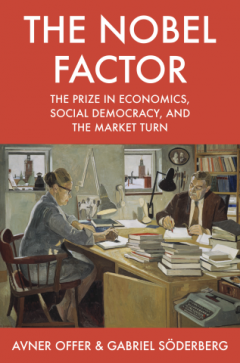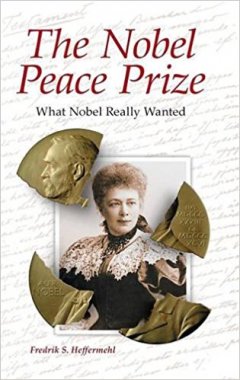Bill Mitchell on the three winners of the 2010 Nobel Prize
"It is claimed that the work of the three winners has “conferred the greatest benefit on mankind” (being the criteria for the award). The reality is that the major insights to be drawn from this trio is that mass unemployment does not exist and that unemployment is largely voluntary or a function of over-generous income support policies by “misguided” governments. The policy recommendations to be drawn from their work focus on cutting the meagre benefits that governments provide to the unemployed in times of strife. The winners’ work tells us that they think workers are lazy and do not search effectively enough, in part, because they have it too good in their jobless state.
Fact: The Swedish Central Bank made the Nobel Prize in Economics to Destroy Social Democratic Economic Policies
"Economic theory may be speculative, but its impact is powerful and real. Since the 1970s, it has been closely associated with a sweeping change around the world—the "market turn." This is what Avner Offer and Gabriel Söderberg call the rise of market liberalism, a movement that, seeking to replace social democracy, holds up buying and selling as the norm for human relations and society. Our confidence in markets comes from economics, and our confidence in economics is underpinned by the Nobel Prize in Economics, which was first awarded in 1969. Was it a coincidence that the market turn and the prize began at the same time? The Nobel Factor, the first book to describe the origins and power of the most important prize in economics, explores this and related questions by examining the history of the prize, the history of economics since the prize began, and the simultaneous struggle between market liberals and social democrats in Sweden, Europe, and the United States.
The Nobel Factor tells how the prize, created by the Swedish central bank, emerged from a conflict between central bank orthodoxy and social democracy. The aim was to use the halo of the Nobel brand to enhance central bank authority and the prestige of market-friendly economics, in order to influence the future of Sweden and the rest of the developed world. And this strategy has worked, with sometimes disastrous results for societies striving to cope with the requirements of economic theory and deregulated markets. Drawing on previously untapped Swedish national bank archives and providing a unique analysis of the sway of prizewinners, The Nobel Factor offers an unprecedented account of the real-world consequences of economics—and its greatest prize."
The Nobel Factor. The Prize in Economics, Social Democracy, and the Market Turn, 2016, Avner Offer & Gabriel Söderberg, Princeton University Press
"The title of 'Nobel Prize-winning economist' is frequently used to impart a sense of gravitas, authority and scientific expertise. However, the status of the prize - created and funded by the Swedish Central Bank, rather than the Nobel Foundation itself - has long been a matter of controversy. In the following interview with the Institute for New Economic Thinking, Philip Mirowski argues that the history of the prize is inseperable from the rise of neoliberal economics, which it continues to legitimise as the one true eonomic 'science' in the eyes of the mass media and political institutions."
'What is a 'Nobel Prize-winning economist'?', Philip Mirowski investigates
Sociology Notes on The Profession's Power and Ignorance
Nobel Prize economists have shaped the economic profession. But it is The Swedish Central Bank that has had and still has the power to control the selection of economists, who shall receive the prize. The Swedish Central Bank simply control, what should be rewarded; what shall and what shall not count as important, true and correct knowledge in the economic profession. In short, The Swedish Central Bank has more or less controlled the development of the Western economic profession and hence also the development of economic faculties all over the Western world. The role of MIT is important here too (will come back to research this).
This way we have a uniform neoliberal economic profession that is spread all over the Western world. Moreover, the profession is given still much more power as they function in a historical neoliberal hegemonical context dedicated to the rule of (neoliberal) economists, where their advice is praised by neoliberal governments and where their 'knowledge' is blessed with a particularly big social, political and scientific legitimacy - also via the continued prestige-blessings by the Nobel Prize. It is like a waterproof system dedicated to god-like untouchable experts.
No wonder, that practically no economist from withing the profession ever feels an urge to question not to talk about problematizing the social power and the legitimacy of their scientific credentials, which their scientific power monopoly rests on. They simply cannot fail, mind you, as long as they stick to the neoliberal and neo-classical dogmas. This way, and this way only, they enjoy the full benefits of the power and the glory. Add also, that they are systematically trained not to be able to understand the connections between their 'science' and the real world. As for social reality, it seems that Harold Pinter's diagnosis of Western muteness fits in here too: "You wouldn't know it. It never happened. Nothing ever happened. Even while it was happening it wasn't happening. It didn't matter. It was of no interest." For the economists, the important thing is the concept of less 'hindrances' toward a free market utopia and, of course, their mathematical models. It is tragic-comical.
Pierre Bourdieu explains the economic profession: "Without necessarily sharing the economic and social interests of the true believers, economists have sufficient specific interests in the field of economic science to make a decisive contribution, whatever their emotional responses to the economic and social effects of the utopia that they dress up in mathematical reason, to the production and reproduction of the neo-liberal utopia. Cut off by their whole existence and above all by their generally purely abstract and theoretical intellectual training from the real economic and social world, they are, like others in other times in the field of philosophy, particularly inclined to take the things of logic for the logic of things.
Trusting in models that they have practically never had the occasion to subject to experimental verification, tending to look down from on high on the conclusions of the other historical sciences, in which they recognize only the purity and crystalline transparency of their mathematical games and whose real necessity and deep complexity they are most often unable to comprehend, they participate and collaborate in an enormous economic and social transformation which, even if some of its consequences horrify them (they may subscribe to the Socialist Party and give considered advice to its representatives in the highest decision-making bodies), cannot entirely displease them, since, with a few 'blips', mainly attributable to what they call 'speculative fevers', it tends to give reality to the ultra-consistent utopia (like some forms of lunacy) to which they devote their lives."
Still, the economic profession function as a uniform non-controversial scientific collective, as if there were no basic assumptions to problematize or discuss. This 'science' has gotten a most simple but powerful mission (no doubt, most of the economist have no idea that they have been duped), that is, to systematically whitewash and praise all kinds of neoliberal policies with scientific legitimacy.
The Western economic profession is completely disconnected from reality and infested with neoliberal ideology and mathematical abstractions. It is a profession based on totally false and destructive ideas and assumptions, which coincidently back all the neoliberal policies originating from the corporate system's ideological drafts for a neoliberal utopia.
What are the consequences in the real world? Just look at our societies' development since 1975. The Western world has been experiencing the same economic thinking, the 'chok-doctrine that used to be used only on 'third-world' nations and for Russia's 'katastroika', where it continues a systematic destruction of the historical civilizational gains that were won through labor and political struggles up through the twentieth century.
It is totally false and totally destructive. Thatcher's and Reagans' infamous TINA dictum: There Is No Alternative is a false iron cage created by big business and upheld by scientific fraud. The most amazing thing is perhaps that most economists have never realized that they have been duped into acting useful idiots to help implement the neoliberal utopia. They have never received any training that gives them the intellectual tools necessary to question their neo-classical economic training. So, they are in fact helpless but powerful people-suppressing fools (tools).
Professor Demands the Abolition of the Nobel Prize in Economics
"Bo Rothstein, an important member of the Royal Swedish Academy of Sciences, has today in Sweden’s most widely read newspaper called for an immediate declaration of a moratorium on the awarding of Sveriges Riksbank Prize for Economics in the name of Nobel and the Nobel Foundation.
Rothstein’s article argues that today with increasing success, economics as commonly taught in universities and endorsed by most winners of the economics prize promotes corruption in societies around the world. Therefore he concludes that the Nobel Foundation’s awarding the economics prize is “in direct conflict with what Alfred Nobel decreed in his will.”
“I will,” writes Rothstein, “therefore now take the initiative in this matter.” Below is a Google-translation of Rothstein’s article.":
Key member of Swedish Academy of Sciences calls for immediate suspension of the “Nobel Prize for Economics”, 2015, Edward Fullbrook


